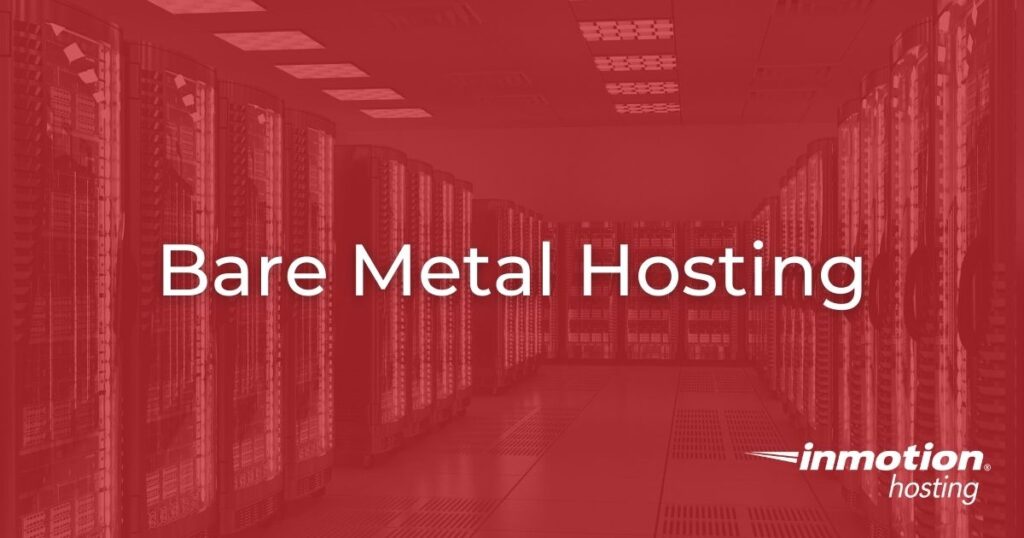
When attempting to determine which type of server is best for your needs, you may find yourself looking for a hosting solution that simply provides the hardware and allows you to install whichever operating system you prefer. Instead of purchasing a pre-configured CentOS server with cPanel and WHM already installed, Bare Metal Servers offer you the opportunity to customize the Dedicated Server to suit your individual needs. In this article, we will explore why Bare Metal Servers may be the right choice for you as well as discuss how it differs from other forms of server hosting.
Topics Include:
Take your digital presence to the next level through state-of-the-art hardware and your preferred operating system with Bare Metal Servers!
Why Use Bare Metal?
Bare metal servers are single-tenant, physical servers. This type of server is distinct from virtualized or cloud-based server hosting, as it does not rely on a layer of virtualization to create the server environment. As each server only holds a single-tenant, there is no sharing of resources that would typically occur on a cloud-based virtual server.
Bare metal servers offer the highest levels of customization and performance capabilities. State-of-the-art hardware can be combined with your choice of operating system, giving you the power and flexibility that is not available in other types of server infrastructure. This type of platform is useful for web developers and those looking to create a high-performance sandbox environment for website or application development. Bare Metal servers can also serve as a jumping-off point for enterprises looking to set up automation strategies to create their own cloud infrastructure.
Difference Between Flex Metal and Bare Metal Servers
While researching the server infrastructure that is right for you, you have likely come across the terms bare metal and flex metal, sometimes used interchangeably to refer to an unmanaged server that provides flexibility in terms of OS installation. At this point, it is worth taking a look at the differences between Flex Metal and Bare Metal server platforms.
Flex Metal refers to a virtualized, cloud-based server platform that comes with a pre-configured operating system of your choice. This differs from standard cloud-based VPS platforms that only offer one operating system. Flex metal servers exist in virtual environments, oftentimes with several tenants occupying the same physical space. While this form of hosting is more affordable, it requires that system resources be shared among all server residents, creating resource availability issues that may interfere with your web-based applications and websites.
Bare Metal servers, as previously mentioned, differ from Flex Metal servers in that Bare Metal servers exist as single-tenant, physical servers that can have a variety of operating systems pre-installed. This differs from standard dedicated servers that only offer a single choice of operating system, providing an additional level of customization in addition to the hardware options that are typically available to dedicated servers. As system resources are not shared among multiple tenants, bare metal servers are better suited for resource-intensive applications. For additional information, check out our guide on Migrating to Bare Metal.
Managed vs Unmanaged
Another pair of terms you have likely seen when researching dedicated server hosting are managed and unmanaged. While these terms mean slightly different things depending on the hosting provider, generally they each refer to a distinct style of support that is offered for each product.
Managed servers are supported by a full team of system administrators that monitor the backend systems involved in your server hosting experience. This is great for users that want to focus on the front-end aspects of their web presence and not worry about the system administration tasks. Generally, managed servers come pre-installed with a GUI-based control panel such as cPanel that allows for easier management of server functionalities. As such, Managed Servers may be better suited for users that aren’t as comfortable with command-line interfaces.
Unmanaged servers differ in that they do not receive this same support, making it vitally important for users to set up their own monitoring systems and provide their own system administration. This option is great for users that want to take complete control of their server experience and handle all aspects of system administration as they see fit. Generally, unmanaged servers do not come pre-installed with a GUI-based control panel and must be managed using the command-line interface. This makes unmanaged servers better suited for users that would prefer the efficiency facilitated by command-line utilities.
Now that you are familiar with the differences between Flex and Bare Metal server platforms, you are better equipped to decide if Bare Metal Servers are right for you!
Comments
It looks like this article doesn't have any comments yet - you can be the first. If you have any comments or questions, start the conversation!